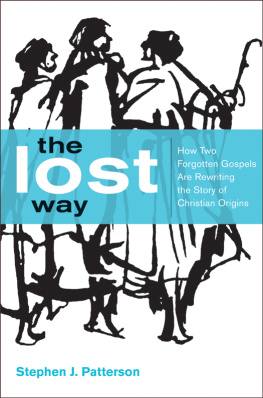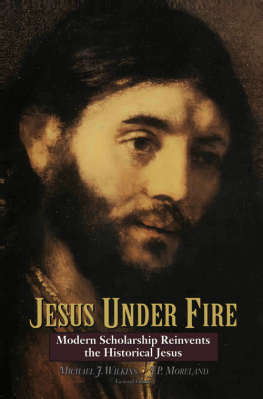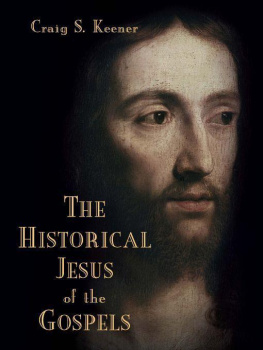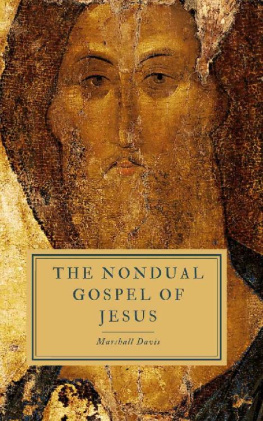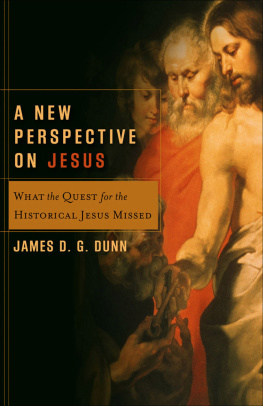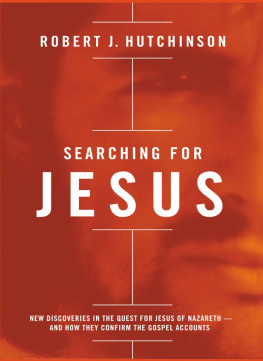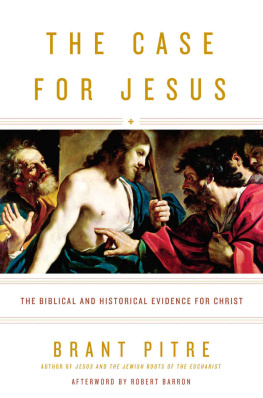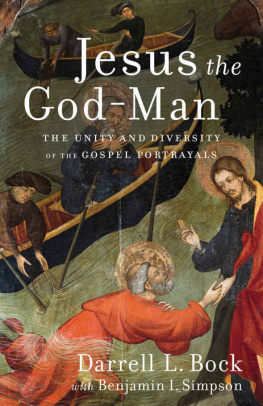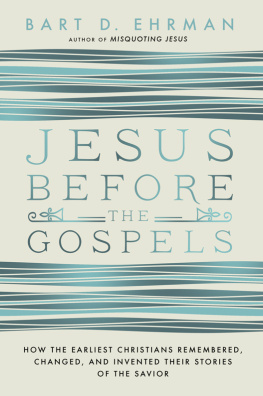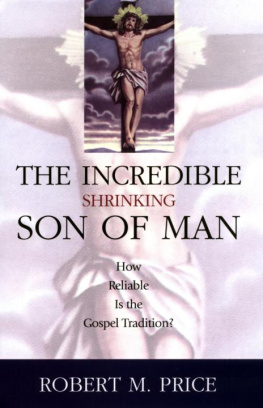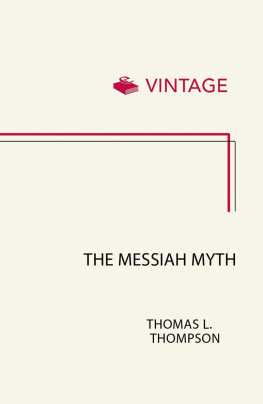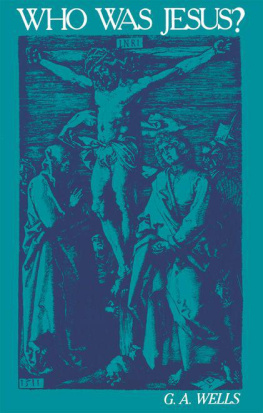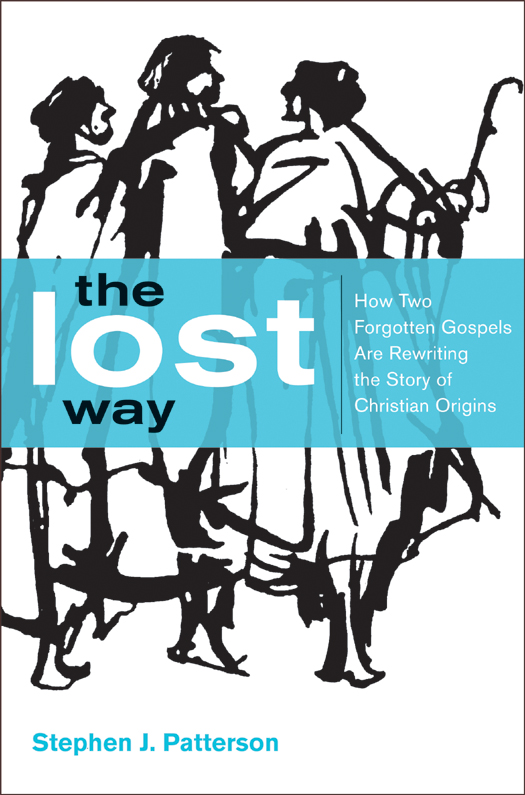For Marvin Meyer
CONTENTS
Guide
To acknowledge and thank everyone in whose debt I labor would take another book-length manuscript. But there are a few without whom this book would not have seen the light of day. First, thanks to Michael Maudlin, who agreed to read a finished manuscript from a stranger, and to Marc Borg and Dom Crossan, who convinced him with a word that it might not be a waste of his time. Mickey Maudlins deft handling of the initial work and editors instinct about what would strengthen the work made it a much better book than the one I sent to him. Thanks to Marc for planting the idea that perhaps I should write something people could read. Thanks to Ann Floto, who gave the manuscript her expert attention and helped straighten out the many little tangles. Thanks also to the editorial team at Harper-One: Kathryn Renz, Suzanne Quist, and Natalie Blachere, for their patience and respect for the work. What a pleasure to work with these professionals. And finally I offer my utmost appreciation and respect to Jim Robinson, Helmut Koester, John Kloppenborg, and Elaine Pagels, from whom I have learned so much about Q, Thomas, and the hidden histories these texts represent.
The Scotford Colony of the Hutterian Brethren is a vast farm thirty-five kilometers north of Edmonton, in Alberta. As we wander through the complex of buildings and yards, our host, Daniel (Danny) Hofer, explains to us, by turns, the basics of their sixteenth-century communal lifestyle and the workings of their new milk barnan automated marvel in which hundreds of cows are milked by machines to which they attach themselves. As we contemplate the laser grid aligning robotic milkers to the teats of a restless cow, an old friend approaches. My wife knew many of these Hutterites forty years ago, when they wandered over from the colony to play together on the neighboring farm where she grew up. As she catches up with Susie, who wears a pleated, pressed, long-hemmed skirt, dark blue with polka dots, a white blouse, and a matching dark blue polka-dot head scarf, a robot wanders by and pushes hay closer to the pens, so the cows can reach it better.
Z3PO, says my daughter.
My son corrects, C3PO.
We are in a Star Wars dairy built by people who speak a dialect of German that has been dead for more than three centuries. As the robot scoots by, I notice that Susies shoes are Keens. Later, in the school, Danny and Susie show us notebooks in which children have practiced writing this dialect in the most beautiful filigreed, cursive hand, filling pages with select passages of scripture. On Sundays, the colony gathers in this same room to hear sermonsthe original sermons of their founder, Jacob Hutter, the South Tyrolean Anabaptist preacher who was burned at the stake in Innsbruck in 1536. A preacher reads them in Hochdeutsch, just as they were written in the sixteenth century, without alteration, to women sitting on the left and men on the right.
After the tour, we sit around the simple kitchen table of our host and enjoy freshly picked blueberries, tea, and cookies. The mood is friendly, but somber. The occasion for our visit is the impending death of my father-in-law, a neighbor well known to the colony and beloved by all present. Danny knows that I am a professor of religious studies and my wife is an ordained ministeran anomaly as strange to him as his milk barn is to us.
So he asks, What is Christianity?
Danny is very self-assured in all things. This is not the question of a seeker, but a quiz. He wants to know how close our answer will be to the right answer.
Normally I like to avoid the embarrassment of stammering at such questions by offering one of several stock answers I can live with without compromising too much integrity. But today I stammer. I have spent the afternoon working on a translation of Q, a lost gospel from the earliest years of Christianityor what would become Christianity. I have been thinking too much. What is Christianity?
I knew this was going to be a conversation about origins. The Hutterites are all about origins. Their convictions about communal living are based on the Acts of the Apostles, the biblical account of Christian origins. And their pacifism, which I admire, is based on Jesuss Sermon on the Mount. But there is a lot more to the Christianity of Hutterites than this. Like most traditional Christians, they believe that Jesus is the Son of God, literally, and that his death was a blood sacrifice to atone for the sins of humanity. They believe that Jesus then rose from the dead, literally, and in this way conquered death, so that whoever believes in him might live on after death, in eternal life. These things are not incidental to the Hutterites. Indeed, they are quite central, under the present circumstances of our reunion. And Danny had every reason to expect that these fellow believers sitting at his table would share these traditional beliefs.
After a moment during which I must have had an odd, blank stare on my face, I say the wrong thing. Christianity is many things.
I was thinking about origins and Q, that lost gospel I had been working on. Q was a text used by the authors of two biblical gospels, Matthew and Luke. It is, then, an earlier version of the gospel. In Q there is no account of Jesuss death and resurrection. And it is hard to tell if Jesus is even the Son of God. He might be the Son of Man, but in Q that is probably something different from Son of God. In Q Jesus seems to be on a par with John the Baptist, the teacher and prophet who baptized him in the Jordan. Like John he is a teacher and a prophet, a child of Wisdom. His sayings are wise and clever, and often challenging. Anyone who does not hate father and mother cannot be my disciple. Is that Christianity?
Sometimes he tells a story to illustrate his dominant theme: the kingdom of God, or, as I prefer to call it, the empire of God. In the empire of God people dont worry about what they shall wear or ownDanny would embrace this, I think. They share meals and care for one another in sicknessagain, things my Hutterite friend would recognize. But then there is the story of a person who sows mustarda weedin his field. What has Christianity to do with weeds? Most of what Jesus teaches in Q is difficult for everyone: Love your enemies. Do not judge, lest you be judged. Whoever strikes you on the cheek, turn to him the other as well. To anyone who wants to take you to court to get your shirt, give him your coat as well. Is Christianity, then, simply difficult virtue? Admirable, but hardly unique.
As I sat contemplating what to say next, my thoughts turned also to the Gospel of Thomas. Here too was a very early expression of Christianity that had nothing to do with the central claims of traditional Christianitythat Jesus died for our sins and rose from the dead. In Thomas, Jesus never dies. He is the living Jesus. Like Q, Thomas is a wisdom gospel, in which Jesuss wise sayings are offered with the promise, Whoever finds the meaning of these sayings will not taste death. In this gospel too there are difficult sayings telling you to hate your mother and father, not to worry about what you will wear, and to give away your money. But there are also strange sayings, like the one that says you must make the male and the female into a single one, so that the male will not be male and the female will not be female... then you will enter the empire (of God). I think that Danny would like some of these sayings too though, especially one like If you do not fast from the world, you will not find the empire (of God). But these sayings and this gospel are not in the Bible. Could one trust a gospel that is not in the Bible to speak about the meaning of Jesuss teachings? And could salvation rest on a search to understand such odd, koanlike sayings? If you bring forth what is within you, that which you have will save you. This is unique but odd. Was Jesus odd?

